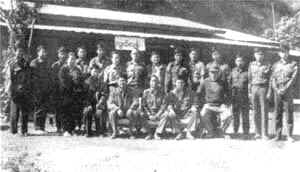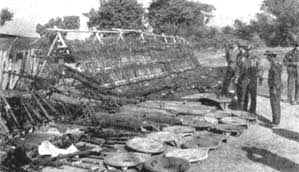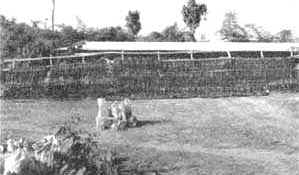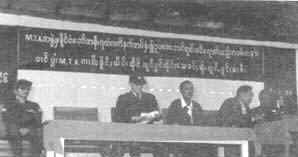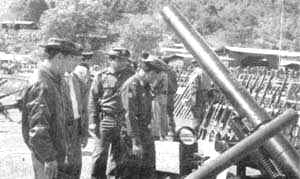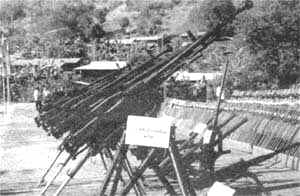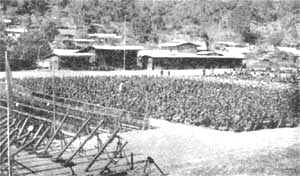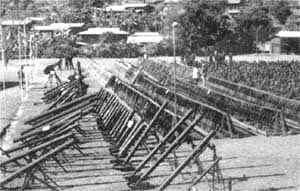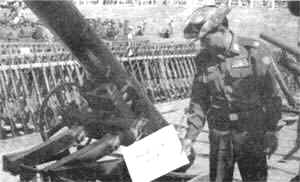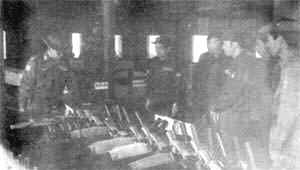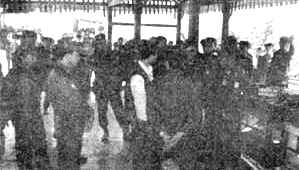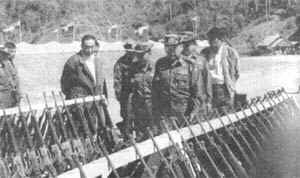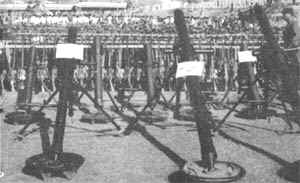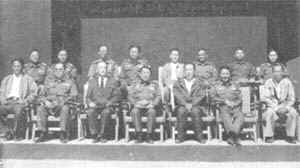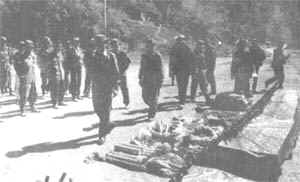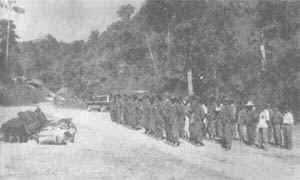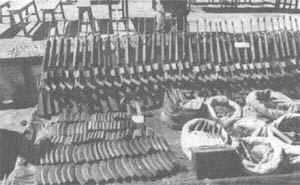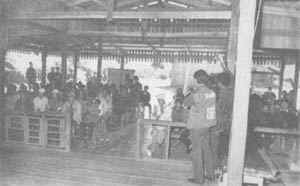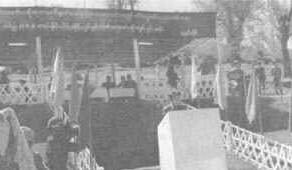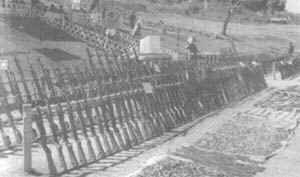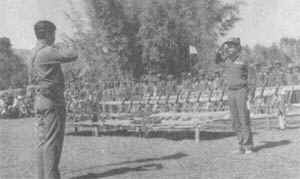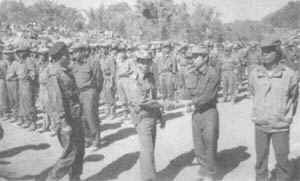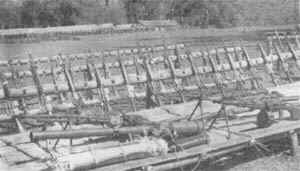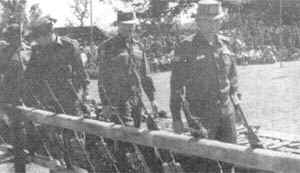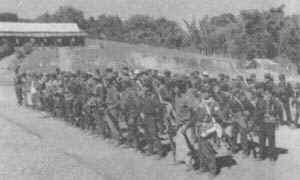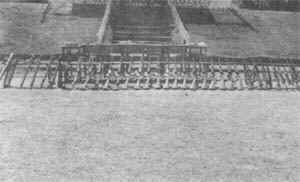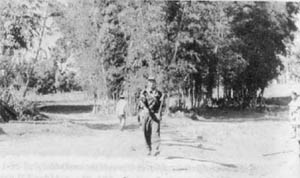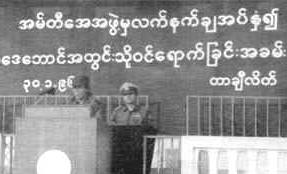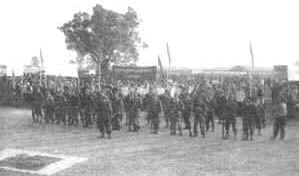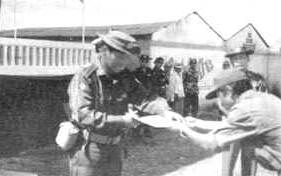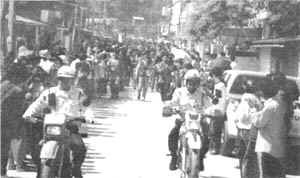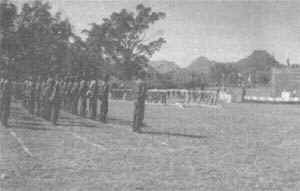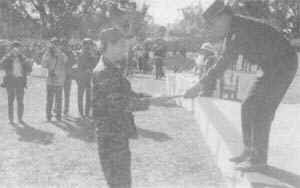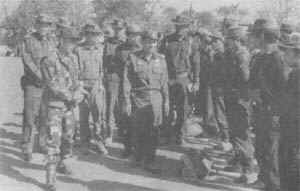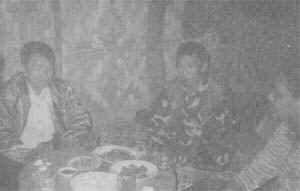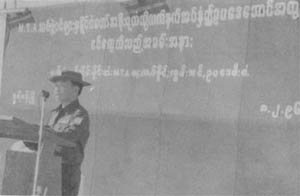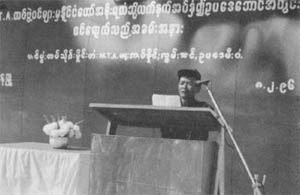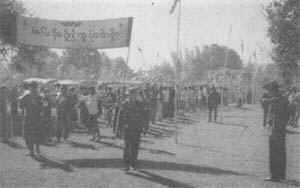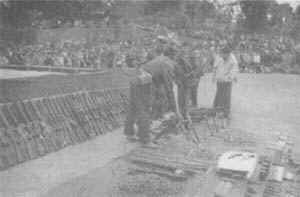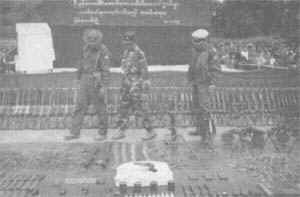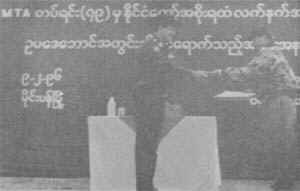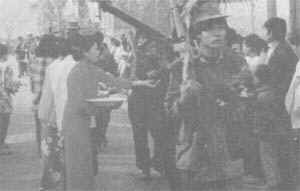| Why
Did U Khun Sa’s MTA Exchange Arms for Peace |
|
Part VI In the ensuing conversation with my friend, I asked him about the aftermath of the first surrender in the Lwe Lan region and of the subsequent surrenders that took place at the Hoe Mein Headquarters and other locations. “Let me give you only some of the highlights of the surrender ceremonies at various camps, except for the first one that was conducted at Ho Mong Headquarters on 7th January. I think you’ll be interested in that particular scenario.” “I’m interested in everything that you have to say.”
After the surrender ceremony at Lwe Lan on 5-1-96.
After the surrender ceremony at Lwe Lan on 5-1-96.
After the surrender ceremony at Lwe Lan on 5-1-96. “It was on the evening of 6th January. All preparations for the ceremony the next day had been completed and all the weapons had been systematically stacked. Then members of the Military Intelligence delegation escorted by U Khun Sa, U Kyan Hsu Shin and a few MTA leaders made an inspection round of the arrangements at the parade ground. I watched U Khun Sa closely at the time. He was smiling and talking all the while and leading the way to show what had been done. I couldn’t detect even a single sign that he was dissembling in any way to conceal his real feelings; he appeared quite calm and relaxed. Afterwards he sat on a settee that had been placed on the stage to face the assembly. I saw him gazing at the mountain ranges on the west where the sun had begun to set. He appeared immersed in thought, possibly pondering on his past or future, so I thought. But I did not notice even a slight shadow of regret, sorrow or disappointment. He appeared absolutely normal and yes, even quite relieved and cheerful. But put yourself in his place and think my friend. After all he too is a mere mortal just like you and me. So how do you think he felt? To use an extravagant figure of speech, I would say he was like a king, who was about to abdicate, wasn’t it? “Yeah, sure. Letting go like that was quite a bold move.” “Well! The next day on 7th January, Commander of the Eastern Military Command Major General Tin Htut and his delegation arrived at Hoe Mong. U Khun Sa himself greeted the dignitaries and the ceremony began at 1140 hours. The actual handing over of the 2778 men and 1626 assorted weapons together with recorded lists to Major General Tin Htut was performed by Central Committee member U Khun Mein on behalf of U Khun Sa. Next the Commander addressed the assembly and so did U Khun Mein on U Khun Sa’s behalf. Then U Khun Sa descended the dais and escorted Major General Tin Htut to inspect the troops and the surrendered weapons. He was smiling, and I daresay with absolute certainty, that it was a smile of fulfillment. The Commander and company were then entertained to lunch after which U Khun Sa presented a gift with deep symbolic significance. It was the double barreled rifle which he had cherished and used since he was a youth and which had never left his side.” “When the news of the surrender ceremony was broadcast on TV, I made it a point to watch it carefully because I had never seen U Khun Sa before.” “The second surrender ceremony was held at Hoe Mein on 18th January. One thousand seven hundred and twenty-eight men surrendered together with 1096 weapons.” “As far as I remember MTA surrender ceremonies that took place then were telecast almost daily at the time.”
The First ceremonial surrender at Ho Mong on 7-1-96.
The First ceremonial surrender at Ho Mong on 7-1-96. “Yes, that’s so. Beginning from 5tb January with the surrender at Lwe Lun/Lwe Toon region other surrenders followed almost consecutively at Hoe Mein, Mone Tawt/ Mone Hta, Tachilek and Mong Yawng east of the Than Lwin River. West of the Thanlwin River, similar ceremonies were held at Mong Pan, Lin Khai, Kunheng, and Namsan regions. Then other ceremonies followed at Tanyang, Naung Line, Hpartan, Mon Hin and Mon Ha regions in the northern Shan State. The number of men, weapons and ammunition surrendered up till 2nd April as far as I recall, roughly totalled over 14,000 men, over 8,300 assorted arms, over 2 million rounds of ammunition and more than 4,700 assorted mines.” “That is no mean amount. But even then it is being said that there are still some weapons and ammunitions left over and that they’ve been stashed away somewhere.”
The surrender ceremony at Mong Htaw – Mong Hta – Pan Se Htauk on 15-1-96. “That’s right. It’s a reasonable assumption anyway. U Khun Sa himself foresaw this and requested the authorities beforehand to pardon any arms that may have been inadvertently overlooked. You see some weapons and ammunitions were sometimes hidden and then lost track of and then there were other losses due to unforeseen circumstances. He had made this request to forestall later misunderstanding if some arms should turn up or be unearthed later. And as expected, up to now, weapons are being uncovered and found here and there. To my knowledge, over 600 firearms and 400,000 rounds of ammunition have been found so far. In addition, some individuals or small groups of men in the border areas who were not part of the official surrender are still straggling in to lay down their arms.” “Excuse me a moment. What assistance did the government provide for those who laid down their arms?” “There were a lot of them you know, but the Government did see to their welfare. It provided travel expenses at the rate of K2,000 for other ranks; K3,000 for officers and K5,000 for an officer of commanding rank. They were also issued adequate rations for the duration of the j ourney they had to make . The youth cadres received the same amount of cash as the rankers. Reception stations were also set up at certain points to escort the surrendered personnel home and thus ease travel.”
The second surrender ceremony at Ho Mong on 18-1-96.
The second surrender ceremony at Ho Mong on 18-1-96. “These youth cadres that you just mentioned. are they children say about 4 to 6 years old recruited by your MTA? There was much fear and anxiety over this matter even in our neigbourhood. How did you settle the matter of these children?” “These children were mostly orphans found in villages or children of families who were really destitute. Yes, we did recruit children from the age of 4 to 6 years. They would of course be trained later to become MTA members once they were old enough. Before our surrender there were over 2,000 children between the ages of S or 6 to about 15 years old. When news of our imminent surrender became known, relatives from villages in our vicinity came for some of them. About 1,000 children from more distant areas west of the Thanlwin River remained behind.” “So, what arrangements were made for them?”
The surrender ceremony in progress at Mong Htaw – Mong Hta – Pan Se Htauk on 21-1-96.
The surrender ceremony in progress at Mong Htaw – Mong Hta – Pan Se Htauk on 21-1-96. “There’s no cause for alarm my friend. The military authorities saw to it that they were sent home to their parents or relatives back in the villages. Even those who lived in far away places like T.anyang were sent home safely. Everything was done systematically.” “Then you must have had proper housing, schools and classrooms, offices and food provisions for these youngsters?” “Most certainly. It was in fact.more than adequate. We transferred all this to the military authorities at the time of our surrender.” “There’s one question nagging me. We didn’t hear any mention of heroin refineries as part of the surrender.”
Chief Administrator of the MTA No. 2 Region Bo Mun and Brigade Commander Khun Hla, Deputy Brigade Commander Hsan Lu of No. 6 Brigade and 778 members hand over arms to Tactical Operations Commander of North-East Command Lt. Col. Aye Kyu on 23-1-96.
Chief Administrator of the MTA No. 2 Region Bo Mun and Brigade Commander Khun Hla, Deputy Brigade Commander Hsan Lu of No. 6 Brigade and 778 members hand over arms to Tactical Operations Commander of North-East Command Lt. Col. Aye Kyu on 23-1-96.
On 25-1-96 Brigade Commander of MTA No. 12 Brigade Mone Hin Region U Law Maw with 173 men hand over arms to Tactical Operations Commander Lt. Col. Hsan Hsint. “My friend what do you think a heroin refinery is like? It’s nothing like the huge factories and refineries with smoke belching from their stacks that you see in industrial areas. What you call heroin refinery is more or less, a small temporary shack with a canvas roof, maybe. Such small tents are the most suitable because ventilation is good. The smell of the chemicals is carried away and dissipated in the open air and it also eliminates the danger of chemical explosions. You can’t possibly process opium near human habitations like towns and villages. The smell is noxious and such a refinery must have proximity to water, like a stream or creek. So, how could we refine opium near our headquarters or near villages. And I did make it clear to you right from the beginning that the business of refining opium to heroin was mostly carried out by people from the country next door. Moreover, this processing has to be done as close to the border as possible and in deserted areas. In any case, since we were about to surrender, so how could you expect to find heroin refineries still standing? Only a few tell tale signs remained. But believe you me, it was our neighbours rather than the MTA, who did most of the refining.”
MTA Commanding Officer of MTA No. 72 Regiment San Thiha and Mong Kyet Regional Officer-in-Change, Sai Pan with 51 men, hand over 34 weapons to No. 3 Tactical Operations Commander Lt. Col. Aye Kyu on 26-1-96.
On 27-1-96 twelve MTA soldiers led by deputy artillery company commander Khun Sitt Myn of U Law Mar’s No. 12 Brigade surrender their weapons to Tactical Operations Commander Lt. Col. Hsan Hsint on 27-1-96. “I believe former SURA members now in Thailand commented that Khun Sa was selling the Shans down the river.” “Those who are resentful and dissatisfied with the surrender will naturally blame U Khun Sa. But, I think, he not only made the right decision but acted upon it. He didn’t try to wriggle out of the tight spot alone. He didn’t turn a blind eye and ignore the rest of the MTA members. As I told you, he made meticulous arrangements so that the surrender would not lead to unnecessary bloodshed and create more problems in its wake. As soon the surrender had been completed, he worked together with the Government to stabilize the region and helped to set up a civil administration. Only when all MTA units in the various and scattered districts and localities had surrendered and there was nothing left for him to do, did U Khun Sa leave Ho Mong. The Government on its part kept its pledge to provide him with complete safety and security within the country.”
On 29-1-96, Officer-in-Charge of Lwe Taw Khan Village Tract of Company Commander Ar Lin eaters Tachilek with 38 men to exchange arms for peace.
Ah Lin of Company Commander rank and 38 men hand over arms to Tachilek District Peace and Development Council Chairman Lt. Col. Khin Zaw at a ceremony on 30-1-96.
Sai Pan of section commander rank leads 41 men to hand over weapons to TOC Commander Lt. Col Soe Yee at Tachilek on 1-2-96. “OK, OK. I asked the question based on hearsay. But judging from all he has done, he’s probably a different person from what they say.” “There’s one thing I forgot to mention. There are still some permanently disabled MTA members, people who’ve lost their limbs, living in Ho Mong with their families. They have nowhere else to go. So they’re still there earning their livelihood with agriculture and livestock breeding. Previously they were supported by U Khun Sa. After the surrender, he appealed to the Government to give aid and assistance to enable them to make a living. The Government agreed and is still giving them whatever help is needed.”
Second-in-Command of No. 206 Battalion leads 58 men in exchange arms for peace and hands over weapons to. Acting TOC Commander Lt.Col. Soe Yee at a ceremony held at the Tarlay Village – Tract Sports Grounds, Tachilek Township on 14-2-96. “Well, I suppose people who are opposed to almost everything will talk ill, no matter what! At the time of your surrender, the NLD roadside soapbox orators were at their loudest, ranting at passers-by. On one of these occasions they held a sort of talk show in the form of Questions & Answers. They had nothing good to say about the Government or U Khun Sa and his MTA. There were a lot of veiled remarks and innuendoes to discredit and defame all concerned.” “Let them say anything they want. We all know that the people as a whole welcomed the surrender and are glad about it.”
Battalion Second-in-Command Ywet Mein and 61 men of No.8 Brigade under U Khun Aung Tun Marching towards venue for Exchange of arms for peace to hand over weapons to TOC Commander Lt.Col. Khin Maung Soe on 20-1-96.
Fifty-Seven members led by C.O. of No. 1030 Battalion of MTA No. 273 Brigade Han Mein hand over arms at Kone Mon village, Nant Sam Township on 25-1-96 to TOC Commander Lt. Col. Khin Maung Soe.
One Hundred and Five MTA members led by No. 8 Brigade Commander U Khun Aung Tun give up their arms to Commander of North-Eastern Command Maj.Gen. Tin Htut in Nant Sam on 20-1-96.
Deputy Commander of MTA No.8 Brigade Leading 174 men to give up their arms to TOC Commander Lt. Col. Khin Maung Soe at Nant Sam on 8-2-96.
Brigade Commander of No. 273 Brigade U Lwe Cho and 135 men to give up their arms to TOC Commander Lt. Col. Khin Maung Soe at Nant Sam on 8-2-96.
C.O of MTA Battalion (208) Sai Khan leading 142 men surrander their arms at Maing Yaung to TOC Commander Lt. Col. Soe Yee on 8-2-96.
Political Commissar Pein Twan of MTA Battalion No. 79 with 71 men give up their arms to TOC Commander Lt. Col. Thein Nyunt at Maing Pan on 9-2-96. “That’s a fact. We shouldn’t heed negligible and petty matters like that.” “Certainly not. History will speak for itself. It’s the best witness. Because the Armed Forces Government pursued the right national policy it was able to hold discussions and make peace will and the ability to do the right thing. Peace has been achieved in most of the country because these conditions have been fulfilled. Then there was this surge for peace that reverberated throughout the country. You know peace cannot be had just because a single individual desires it. It must be the common desire of the entire group or faction concerned, in fact it must be the desire of the entire people.” “Undoubtedly. No organization can agree to any sort of peace terms just by the will of a single individual. There has to be a consensus.” “It was the same for the MTA. The unconditional surrender succeeded not just because U Khun Sa personally wished for it. It succeeded because there was this consensus for peace among the MTA members. As I said, peace had been established in the areas surrounding our MTA enclave and this had an impact on the people living in areas under our control, in the areas we were operating in. U Khun Sa himself came under this impact and began to entertain thoughts for peace. This coincided with certain military setbacks and losses of the MTA, and also with some turmoil within the organization itself. All this added to U Khun Sa’s wish to end the closing chapters of his life on a positive historical note, propelled him towards a firm decision to surrender unconditionally. The majority of the MTA members who had been hankering for peace approved of his decision and they all helped and contributed towards the realization of this goal.” “That was the right thing to do.” “Actually, I think people who cannot appreciate the true value of peace become hostile and negative in their outlook.” “You’re right. But to be more precise we should say those who reject the value of peace, not those who don’t appreciate peace. Peace is really priceless. Looked at super ficially, there seems to be nothing very unusual or complicated about an arms surrender. People might think it’s quite simple and straightforward. But the complexities involved in making the arrangements, and the difficulties encountered have to be experienced to be believed. Yet what I’ve told you is just what I saw, what I observed and understood to the best of my knowledge. There are still many other factors of which I’m still unaware.” “Leaving aside the difficulties, I want the people with negative and pessimistic views to know the sacrifices made in blood and tears by our Government forces as well as the MTA troops.” “We should also acknowledge those who did not have to sacrifice any blood but nevertheless put their life on the line for the success of this venture. Those who had to make their way through a hail of bullets and a path of mines to establish contact like the facilitator and the intelligence delegation. We must acknowledge what is clearly due to these emissaries of peace. Next, we ought to take into account the patience and fortitude and good will exhibited by the leaders of both sides and even the MTA troopers for obeying orders without a murmur.” “You’ve said it! Those who don’t care for the country or the people are bent on destroying the peace that has been achieved. Not only is lending a helping hand in the peace process far from their thoughts, they are trying to sabotage it. Just look at what the NLD is doing. Even a child would know that their plan to convene a parliament is against the law.”
A remnant group of 42 MTA members under the command of Battalion Commander Li Chan surrender their arms to the Commanding Officer of the Namkhan region Battalion on 12-10-98. “Hm, I want to say to all those who only harbour ill will and are therefore intent on obstructing peace that: ‘Yes ! Our MTA was indeed involved in drug trafficking and that we committed crimes. We don’t deny a thing. But today our MTA has done a great service to the country and the people with our unconditional surrender. It is more than a simple surrender. It is a gift of peace, a peace that is significant, absolute and permanent for the benefit of the people. It can even be said that with this priceless gift we have washed away our past misdeeds.’ But to those persistent antagonists who with evil intent are doing all they can to wreck the peace, I wish to warn them that their crime is far greater than that of drug traff1cking and that they will go down in history as the ‘destroyers of peace.’ “ What my friend said is right, and giving such a warning is justified. Peace is desired by the people as a whole this priceless peace that had been so sought after and yet had remained so elusive through all these years in spite of all efforts made. There ‘s no denying the MTA played a significant role in the quest for peace and that peace now prevails in most parts of the country. I believe that these former MTA members and the people share the common desire to make this hard-earned peace, a permanent one. The picture is now very clear as to who really wants peace and who does not, who worked heart and soul to achieve peace and who are bent on destroying it. I am convinced that the time is now ripe for the entire Myanmar people to oppose and rid the country of these betrayers who are trying to demolish the peace so dear to them. |
